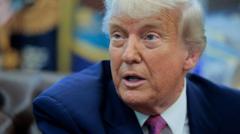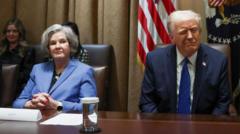President Trump has set a two-week ultimatum for Vladimir Putin, indicating tougher responses if peace discussions fail amid heightened Russian aggression in Ukraine.
Trump Warns Putin: Two-Week Deadline Imposed Amid Escalating Ukraine Conflict

Trump Warns Putin: Two-Week Deadline Imposed Amid Escalating Ukraine Conflict
Trump's ultimatum coincides with intensified Russian attacks in Ukraine, revealing frustrations over stalled negotiations.
In a surprising shift, US President Donald Trump has announced a two-week deadline for Russian President Vladimir Putin to indicate whether he is genuinely interested in ending the war in Ukraine. This statement came during a press briefing in the Oval Office, amid escalating Russian military operations that have been described as some of the deadliest instances since the war began four years ago.
As Russian bombardments increased, with at least 13 fatalities reported from recent strikes in the heart of Kyiv, Trump expressed frustration over the lack of progress in peace negotiations. His comments reflect a growing impatience as he questioned Putin’s motives, stating, "In two weeks, we will see if he is serious about bringing this to a conclusion."
Trump's recent social media posts have been increasingly critical, claiming that Putin has gone "absolutely crazy" amid fervent actions against Ukraine. Prior to these developments, Trump had engaged in a constructive two-hour conversation with Putin, during which they discussed a potential peace agreement—an opportunity that now seems to have slipped as Russian aggression continues.
Interestingly, Trump's threats do not appear to have deterred the Kremlin thus far. While he hinted at potential consequences if Putin does not take action, the history of his negotiations suggests a pattern of unfulfilled promises. Trump's administration had previously imposed an eight-day suspension of military aid to Ukraine which raised questions about his commitment to supporting ally efforts against Russian incursions.
Amid these strained negotiations, Russian officials, including a Kremlin aide, have interpreted Trump's remarks as misinformed assertions, alleging a lack of awareness regarding military actions in Ukraine. In stark contrast, new German Chancellor Friedrich Merz has pledged ongoing support for Ukraine, including manufacturing long-range missiles to bolster its defense.
Also on the table are Putin’s demands for Ukraine to concede territories that are not currently occupied and a formal recognition of Crimea as a part of Russia. Michael McFaul, a former US ambassador, described this as a strategic ploy to blame Ukraine for any negotiation failures, making an equitable compromise harder to achieve.
With the conflict claiming a heavy toll on both sides, and no compromises apparent, Trump’s two-week ultimatum raises critical questions about the future of US-Russian relations and the ongoing humanitarian crisis in Ukraine.
As Russian bombardments increased, with at least 13 fatalities reported from recent strikes in the heart of Kyiv, Trump expressed frustration over the lack of progress in peace negotiations. His comments reflect a growing impatience as he questioned Putin’s motives, stating, "In two weeks, we will see if he is serious about bringing this to a conclusion."
Trump's recent social media posts have been increasingly critical, claiming that Putin has gone "absolutely crazy" amid fervent actions against Ukraine. Prior to these developments, Trump had engaged in a constructive two-hour conversation with Putin, during which they discussed a potential peace agreement—an opportunity that now seems to have slipped as Russian aggression continues.
Interestingly, Trump's threats do not appear to have deterred the Kremlin thus far. While he hinted at potential consequences if Putin does not take action, the history of his negotiations suggests a pattern of unfulfilled promises. Trump's administration had previously imposed an eight-day suspension of military aid to Ukraine which raised questions about his commitment to supporting ally efforts against Russian incursions.
Amid these strained negotiations, Russian officials, including a Kremlin aide, have interpreted Trump's remarks as misinformed assertions, alleging a lack of awareness regarding military actions in Ukraine. In stark contrast, new German Chancellor Friedrich Merz has pledged ongoing support for Ukraine, including manufacturing long-range missiles to bolster its defense.
Also on the table are Putin’s demands for Ukraine to concede territories that are not currently occupied and a formal recognition of Crimea as a part of Russia. Michael McFaul, a former US ambassador, described this as a strategic ploy to blame Ukraine for any negotiation failures, making an equitable compromise harder to achieve.
With the conflict claiming a heavy toll on both sides, and no compromises apparent, Trump’s two-week ultimatum raises critical questions about the future of US-Russian relations and the ongoing humanitarian crisis in Ukraine.





















